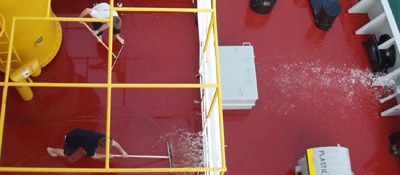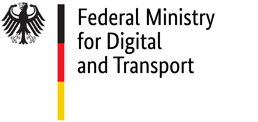Referat ISM/ILO - Bereich Seearbeitsrecht
Brandstwiete 1
20457 Hamburg
Fax: +49 40 361 37-204

Tilo Berger
Phone: +49 40 361 37-213
Mail: ism-mlc@bg-verkehr.de

Sven Reese
Phone: +49 40 361 37-313
Mail: ism-mlc@bg-verkehr.de

Kathrin Saß
Phone: +49 40 361 37-260
Mail: ism-mlc@bg-verkehr.de

Florian Reise
Phone: +49 40 361 37-214
Mail: ism-mlc@bg-verkehr.de
Wages • Seafarer's employment agreements
- Shipowner has to pay his seafarers regularly
- Application of tariff wages
- Up to 16 weeks continued payment of wages in case of illness
- Outstanding wages
- Global mandatory minimum standards
- Written employment agreement for all seafarers
- Model employment agreement
- Collective bargaining agreements
- German maritime bargaining agreement
- German and foreign maritime labour law
- Application of foreign law
- GIS Fleet Agreement
Shipowner has to pay his seafarers regularly
According to Standard A2.2, the Maritime Labour Convention stipulates that seafarers have to receive their wages and the corresponding payslip at least monthly. German law regulates the regular payment of wages in the "Seearbeitsgesetz" (maritime labour act).
Seafarers are entitled to have their wage or a part of it transferred to family members or other people. If the wage is paid in a different currency, the shipowner has to adhere to the official currency exchange rate.

Application of tariff wages
Shipowners operating ships under German flag are not obliged to pay wages according to tariff agreements to seafarers. Tariff wages must only be paid, if:
- the shipowning company is a member of the tariff community of the German Shipowners' Association (VDR) and individual seafarers are members of the ver.di trade union (known as "double tariff"), or
- the individual seafarer’s employment agreement provides for the application of a tariff agreement.
Up to 16 weeks continued payment of wages in case of illness
If a seafarer is unfit to work due to illness or injury the shipowner must continue to pay wages for 16 weeks. On commercially operated seagoing ships under German flag the wages have to be paid in full for six weeks. From the 7th week the wages are reduced to the amount of the illness benefit paid by the statutory health insurance (70 per cent of the average wage, not more than 90 per cent of the latest net wages). Seafarers who are members of the German statutory health insurance receive the illness benefit from there.
Outstanding wages
If a shipowner or employer does not fulfil or only insufficiently fulfils his or her obligation to pay wages, crew memebers on seagoing ships under German flag have several options to take action, among which are the following:
- They make use of their right to complain
- They assert their maritime lienor's rights. We have compiled an Information on maritime lienor's rights according to German law.
Mandatory minimum standards for employment agreements apply world wide
Since entry into force of the Maritime Labour Convention (MLC) mandatory minimum standards for seafarer’s employment agreements and payment of wages apply world wide. A seafarers’ employment agreement must be signed by both the seafarer and the employer/shipowner.
Written employment agreement for all seafarers
All seafarers working on seagoing ships must have a written employment agreement with the employer/shipowner. According to Standard A2.1 of the MLC, seafarers’ employment agreements shall in all cases contain the following particulars:
- the seafarer’s full name, date of birth or age, and birthplace,
- the shipowner’s name and address,
- the capacity in which the seafarer is to be employed,
- the amount of the seafarer’s wages or, where applicable, the formula used for calculating them,
- the amount of paid annual leave,
- the termination of the agreement and the conditions thereof (in case of temporary agreements: date of expiry of the agreement),
- the health and social security protection benefits to be provided to the seafarer by the shipowner,
- the seafarer’s entitlement to repatriation,
- reference to the collective bargaining agreement, if applicable,
- any other particulars which national law may require, in German law: the date when the seafarer’s employment agreement is entered into, the place and date where and when service is taken up as well as agreed hours of work and rest.
The seafarer must be given opportunity to examine and seek advice on the employment agreement before signing. The shipowner must ensure that copies of the employment agreement are carried on board for inspection purposes.
Model employment agreement for the German flag
You can download a
for seagoing ships under German flag which addresses all minimum requirements of the German maritime labour act and the MLC. The use of this model agreement which may be expanded or adapted individually is not compulsory.
Collective bargaining agreements apply only, if so agreed in the employment agreement
German labour law does not require any employer/ shipowner to apply collective bargaining agreements to employees on board of his German-flagged ships. The collective bargaining agreements in the German shipping industry (Manteltarifvertrag See and Heuertarifvertrag See) only apply, if:
- the shipowning company is a member of the tariff community of the German Shipowners' Association (VDR) and individual seafarers are members of the ver.di trade union (known as "double tariff"), or
- their application is expressly agreed in the employment agreement.
German maritime collective bargaining agreements (Manteltarifvertrag See and Heuertarifvertrag See)
The Manteltarifvertrag See (MTV See) provides the recognized framework for working conditions of seafarers in German ocean shipping. It contains regulations of long-term and more general character and its period of validity has not been restricted. The MTV See does not address wage levels, as these are fixed in the Heuertarifvertrag See (HTV See). The HTV See is renegotiated in shorter intervals for adjustment of wages.
The current collective bargaining agreements are available for download:
- Manteltarifvertrag See (MTV See),
- Wage Scale for German Maritime Shipping (HTV-See) 2023/24: valid from 01.10.2023-09.30.2024
- Wage Scale for German Maritime Shipping (HTV-See) 2024/25: valid from 01.10.2024-09.30.2025

German and foreign maritime labour law in employment agreements
On board of German-flagged seagoing ships generally German maritime labour law applies. It is however possible to agree on foreign wages for non-EU seafarers on board of ships registered in the German International Shipping Register (GIS).
Application of foreign law on board of German-flagged ships
Based on the German Flag Act section 21 paragraph. 4, national contract conditions and the applicability of foreign labour and tariff contract law can be agreed upon for non-EU seafarers. The scope of such an agreement on foreign law is however clearly restricted:
- the minimum standards of the Maritime Labour Convention (MLC) must be complied with in any case,
- German fundamental rights must not be violated,
- Aeras of legislation of special public interest (mandatory rules) must not be impaired. Therefore German law stringently applies, inter alia, in the following areas:
- Continued payment of wages in case of illness
- Accommodation and catering
- Medical and social care
- Technical occupational safety, accident prevention
- Maximum working hours and minimum hours of rest
- Repatriation
- Legal protection of women and young persons
- Employment protection legislation for members of the crew members’ representation
- Order on board.
Application of foreign collective bargaining agreements: GIS Fleet Agreement
For German shipowners/employers it may be useful to conclude collective bargaining agreements regarding minimum wages with the International Transport Workers’ Federation (ITF) for German-flagged seagoing ships registered in the GIS. For this, the ITF union and the German Shipowners‘ Association (VDR) have negotiated model fleet tariff agreements (“GIS fleet agreement“ (ISR-Flottenvertrag) and “special agreement to the GIS fleet agreement (ISR-Sondervertrag)“). The net wages resulting from these model fleet agreements are specified in the “GIS Fleet Agreement Wage Scale“. Application of these model agreements for particular ships must be agreed between individual shipowners and the ITF office in Bremen.
The application of ITF agreements on board a ship is indicated by the “ITF blue certificate“. In addition, it is possible to find out on the ITF website via a search mask and the input of the ship name whether the shipowner has closed an ITF contract for the crew. German ships without ITF agreements have repeatedly been the object of worldwide boycott by the ITF and its partner unions in the past, e.g. through longshoremen strikes.


